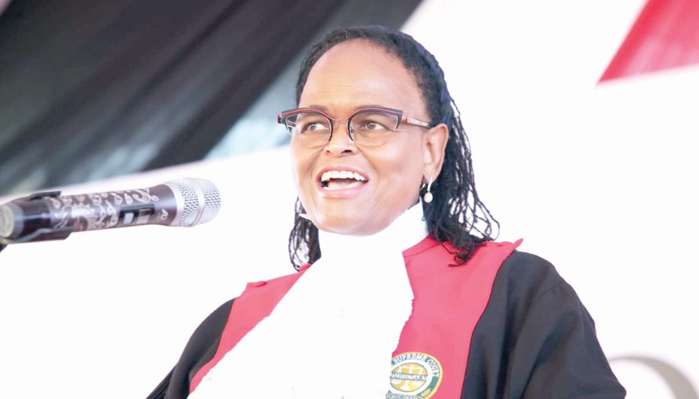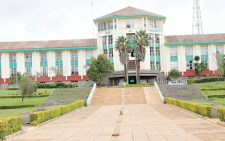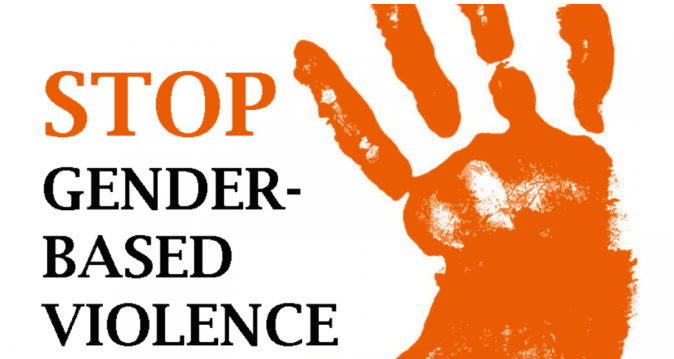Ruto: I’ll disobey court orders on my key projects

President William Ruto testerday vowed to disregard stay orders issued by some judges and implement projects including Affordable Housing and the Social Health Insurance Act.
In a move likely to put him on a collision course with the Judiciary, the Head of State publicly accused some judges of being part of corruption cartels colluding to frustrate government programmes. He vowed to crush such cartels.
Speaking at a funeral in Nyandarua county, Ruto claimed that some unnamed judges were issuing stay orders to frustrate projects initiated by his government.
“We will not allow these people to derail our plans,” he said as he directed Roads Principal Secretary Joseph Mbugua to move with speed and allocate funds for the construction of a road in Nyandarua County which had stalled following a court order.
“The corruption enterprise must come to an end. We’ll deal with them firmly,” Ruto told mourners during the burial of Michael Maigo, the father to Nyandarua Senator John Methu.
During his New Year speech, President Ruto took a swipe at the Judiciary for making decisions against government policies at the expense of the public interest.
The Head of State was referring to the Judiciary’s move to declare unconstitutional, the housing levy and issuance of conservatory orders against the implementation of three health Acts pending the determination of a petition.
This was the third time that the Head of State publicly criticised the judiciary after a similar outburst in July against the courts for temporarily suspending the collection of new taxes introduced through the Finance Act, 2023 and another in Kakamega county last year.
President Ruto’s tirades against the judiciary mirror the frustration expressed by his predecessor Uhuru Kenyatta, who also regularly disparaged judges for allegedly giving generous bail terms to corruption suspects and receiving bribes.
Immediately after he assumed power, Ruto appointed the 41 judges Uhuru had refused to approve, emphasising his commitment to the independence of the Judiciary and promising much better relations between the Executive and the courts including increasing budgetary allocations from Sh17 billion to Sh22 billion.
While maintaining that there was nothing wrong with challenging policy and holding government to account, Ruto in his New Year address said the opposition and the two arms of government (Legislature and Judiciary) had a duty to make sure the best ideas prevail in enhancing the well-being of the people on whose behalf the government acts.
“In the quest to uphold constitutionalism, exercise institutional independence and protect people’s rights, caution must be taken not to dent the very people’s legitimate opportunities like owning homes or accessing healthcare,” Ruto stated.
Housing levy
On November 28, Justices David Majanja, Christine Meoli and Lawrence Mugambi declared the Housing Levy unconstitutional and its continued implementation a contravention of the constitution.
The court, however, allowed the government to continue collecting the levy until January 10 when the case will be mentioned.
The judges ruled that Section 84 of the Finance Act, which amends the Employment Act to introduce the Housing Levy violates the principles of taxation for making distinction between formal and informal sectors, thus creating unequal and inequitable principles.
The court added that the enactment of laws must be supported with a rational explanation but in the case of the Housing Levy, the government failed to explain the imposition of the levy or a legal framework to anchor the fees.
All employees, whether on permanent and pensionable terms or contract-based engagements, started contributing to the Affordable Housing Fund in July 2023, when the Act came into force.
During the same month, the High Court slammed the brakes on implementing and enforcing the Social Health Insurance Fund Act 2023, the Primary Health Care Act 2023 and the Digital Health Act 2023 until a case challenging its legality is heard.
The Kenya Medical Practitioners, Pharmacists and Dentists Union (KMPDU) and an activist had challenged the implementation of the social health insurance scheme.
Justice Chacha Mwita temporarily stopped the State from enforcing three new funds gazetted by Health Cabinet Secretary Susan Nakhumicha pending the determination of a case lodged in court by activist Joseph Enock.
Justice Mwita granted the President, Nakhumicha, the AG, the National Assembly, the Senate, the Council of Governors, the Social Health Authority and other respondents sued in the case seven days to file their responses.












